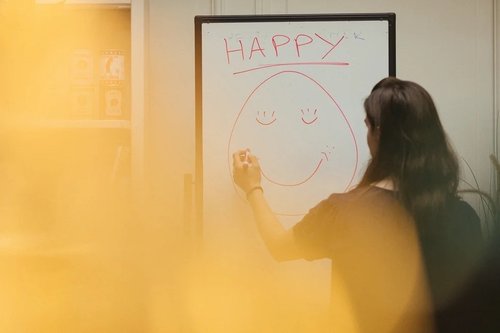Can you be ethical in an unethical business organization?
Apr 04, 2022
8 mins



Business ethics, whether that’s compliance or corporate governance, is largely an organizational issue. But to what extent is it used to boost employer branding and attract individual candidates? And do those candidates buy into the “ethics-washing” efforts carried out by corporations? Or is their bullshit radar too strong to let them be manipulated that way?
We asked Alison Taylor all these questions. She’s executive director of Ethical Systems, a US think tank, and she teaches professional responsibility and leadership at NYU Stern School of Business. Our previous interview focused on the history of business ethics and the two different tracks (compliance and corporate governance) it has translated into. Here we dive into the complex relationship between corporate and individual ethics.
Where does corporate ethical responsibility stop and individual responsibility begin? What are the limits to an individual employee’s own responsibility?
People today want to work for a company whose values are aligned with theirs. So you’ll see more of them evaluating the ethics of their potential employer and deciding if they are comfortable working there. Companies are paying huge attention to what employees are saying. At the same time, I don’t know how realistic it is to say that every company should be able to align with the personal values of every single one of its employees. We’ve got different political views. We come from different countries and cultures, we’ve got different religious beliefs. It can be dangerous to suggest that you can be completely in line with your employees’ values all of the time. It’s also dangerous to suggest that you’re running a democracy where employees can vote and you’ll go with the majority view.
It can be dangerous to suggest that you can be completely in line with your employees’ values all of the time. It’s also dangerous to suggest that you’re running a democracy where employees can vote and you’ll go with the majority view.
Today’s leaders have to walk a fine line. They need to listen and gather views. They need to figure out which ethical, environmental and social issues are important to their business, to their employees, stakeholders, suppliers and investors. But after all that, you’ve got to make a decision and stop debating. You need to be careful not to inadvertently create conflict internally over ethical issues.
Think about a company like Walmart. They’re going to have lots of Republican and Democrat customers and employees. It’s not really in their interests to bring up polarizing issues and foster political conflict. A leader at this company will have to work successfully with people who have different values from them and whom they may personally dislike. Perhaps people ought to be able to withdraw from certain projects and not work in certain countries if it makes them too uncomfortable. But I don’t think this idea that we can always bring our whole selves to work and always expect our employers to prioritize what we believe in is realistic. It’s a fine line that we have to walk. We’re just at the beginning of this conversation.
I don’t think this idea that we can always bring our whole selves to work and always expect our employers to prioritize what we believe in is realistic.
There’s more political polarization within companies, particularly within digital companies such as Facebook and Google, which used to be bastions of liberalism. And episodes like Basecamp’s decision to ban political conversations at work have shed light on political polarization. How does it affect them?
This is the sort of thing that’s changed dramatically over the past five to 10 years. Companies used to be able to say they were politically neutral and wouldn’t get involved in controversial political issues. “Republicans buy sneakers, too. We have no interest in alienating a part of our customer base.” Many businesses try not to be involved in politics. Of course, there’s political spending and lobbying beneath the surface. But the status quo was neutrality, and donations were made across the political spectrum. So if the government changed, they still had allies. And behind the scenes they would lobby for legislation favorable to them.
But since 2014, we’ve been seeing companies getting dragged much more into political conversations. Do you remember the controversy about the transgender bathroom law in North Carolina? Retailer chain Target said they’d have bathrooms open to both sexes, and there was this huge backlash. After 2016 with the Trump administration, more companies got pulled into more and more polarized discussions about immigration, gun control, climate change, and women’s rights.
Saying, “We’re neutral and we’ll just prioritize shareholder value,” that’s no longer seen as neutral. It’s no longer a way to protect yourself from these dynamics. The Spotify controversy is a good example. Spotify probably thought, “Joe Rogan’s making us a lot of money and we’re not going to get involved. We’re just going to stand back.” But that was seen in political terms, even though it wasn’t intended to be political. There’s no such thing as a safe middle ground anymore!
There’s no such thing as a safe middle ground anymore!
This is also what happened at Basecamp. They said they didn’t want employees discussing politics on the internal Slack channel, where they were discussing diversity and inclusion and systemic racism. The decision to call that politics is controversial: if you’re a black employee, for you it’s not politics, it’s personal. Likewise Apple tried to ban a Slack channel discussion on pay equity. Then people started discussing it on Twitter instead. Is pay equity political or is it about my rights as a worker?
Is pay equity political or is it about my rights as a worker?
What do employees look at when they’re seeking an ethical employer? What are the possible criteria? Which labels and signals do they pay attention to?
One of the things I don’t think potential employees look at is your sustainability report. I don’t think they pay much attention to the metrics put forward on the website. Nor do they look at the brochures with smiling children on them. I think employees are rightly cynical about that stuff. They look at things like Glassdoor. They look at online reviews. They think about what they are asked during the interview process. Do they get a chance to have a 360 look at the culture? They may look at things like client acceptance policies. Does the company work with oil and gas companies? They might look at executive pay and decision-making and they might look at lobbying. Those are the kinds of questions I hear job candidates raise in the classroom. I see much more rigor about evaluating possible companies to work for. Is this an organization that is aligned with my values? These are more fundamental governance and leadership questions.
They’re more suspicious, aren’t they? Perhaps they have a better “bullshit radar?”
They do! After the George Floyd protests in the US, a lot of companies started saying “We care about racism” on Instagram. All my students are suspicious. If you don’t look at the composition of the leadership team, the hiring and promotion practices, and the gender pay gap, you can’t have a clear picture. Undergrads are very savvy on how companies use social media to signal. They grew up with social media and they’re better at it than company leaders. And they’re very alert to the gap between what companies say and what they do. It’s reassuring. As the young are now graduating and entering the workforce, people are more sophisticated about this kind of media manipulation. They can get one step ahead of the company a lot of the time. The under-25s really know this stuff inside out.
Would you say that the pandemic has changed anything when it comes to people looking for an ethical company or an ethical job?
It really shed light on workers’ rights. My undergrad students are quite pro-union. Unions had long been thought of as a “socialist” thing. But today’s students think workers should have more rights. They are more sensitive to issues like health-care rights, paid sick leave or oversight of the supply chain. All of that awareness really skyrocketed during the pandemic. More people are aware that the so-called essential workers—nurses, teachers, delivery people, restaurant workers and everyone essential for keeping society going—tend to be the least well paid.
Today’s students think workers should have more rights. They are more sensitive to issues like health-care rights, paid sick leave or oversight of the supply chain. All of that awareness really skyrocketed during the pandemic
Those of us in office jobs have seen this blurring of our personal and professional lives. Working hours are getting longer. Our bosses are looking at our living room, our kids and our cats running around. A lot of people are getting overworked and burned out. As a result, they’re starting to ask more questions about the work. Some companies may have created problems for themselves by saying they have purpose and values and they want their people to feel inspired every day. If you raise people’s expectations but then you can’t meet them, you’re in trouble. “Do I really feel valued, respected and inspired every day? Oh, now you mention it, I don’t.” So now we’re seeing this moment of reckoning about what we expect from meaningful jobs in the first place. A lot of that is the result of the pandemic.
Some companies may have created problems for themselves by saying they have purpose and values and they want their people to feel inspired every day
You’re working on a book about how business can do the right thing in a turbulent world. Can you say more about the ideas?
The premise is exactly what I talk about in this interview. Business ethics is really a set of defenses to manage reputational and regulatory risk. There was this idea that we can protect companies from this scrutiny and they are separate from the societies they exist in. But because of the rise of social media, employee activism, political polarization, and government dysfunction, those defenses don’t work anymore. So if you can no longer create that defensive shield, what should you do instead? I’m trying to look at how we might think about these things more sensibly.
We now expect companies to be responsible for things like climate change and human rights. But at the same time, companies are profit-making entities. We expect them to solve inequality, democracy, climate change, and defend human rights. Are there any limits here? How can companies navigate this? They can’t do everything. They’re not governments. We have much higher expectations but many of them aren’t realistic. We tend to think in terms of good or bad, ethical or unethical companies. It’s a bit more complicated than that. Leaders have to make difficult tradeoffs.
Companies are profit-making entities. We expect them to solve inequality, democracy, climate change, and defend human rights (…) They can’t do everything. They’re not governments.
What’s defined as “ethical” is very much related to culture. How much do cultural differences affect companies and their definition of ethics?
If you’re an international business, which culture should you be aligned to? Do you expect your Indian employees to observe French or American cultural norms? Is that realistic? How much should you adapt to the local environment? Companies have cultures and they have subcultures in their different divisions. The interaction between national culture and company culture is a complicated topic.
But interestingly, unethical cultures do have certain things in common, whether you’re in Malaysia or France or the US. Those things include a strategy that prioritizes growth and competition at all costs, top-down authoritarian decision-making, leaders who say, “Do as I say, not as I do.” If you cannot speak up and raise concerns without being punished or fired or scapegoated, that will degrade the culture. So even though different cultures have different characteristics, I think looking at the relationship between the leaders and everybody else will give you a lot of information about whether this is a healthy culture.
Looking at the relationship between the leaders and everybody else will give you a lot of information about whether this is a healthy culture
Leaders tend to underestimate how difficult it is for people with less power to come to them openly with concerns. If you have the power to set someone’s incentives and fire them, you have to take extra steps to make it easy for people to share what they really think.
Leaders tend to underestimate how difficult it is for people with less power to come to them openly with concerns
You teach a class about leadership for the 21st century. How different is it to leadership for the 20th century?
The way I thought about work when I was in my twenties was that I needed to put up with others telling me what to do until I could get enough power to tell others what to do. You do whatever your boss says and eventually you get promoted and you can boss other people about. We had this idea that leadership was about setting direction, telling employees to perform and then rewarding them. But I don’t think young people want to be managed that way anymore. They don’t want to be told what to do. They want to be mentored and developed and encouraged, and they want to have a say. That’s why CEO job descriptions have changed so much over the past decade. We are now looking for emotional intelligence, soft skills and negotiation. We need different things from leaders.
Photo: Welcome to the Jungle
Follow Welcome to the Jungle on Facebook on LinkedIn and on Instagram and subscribe to our newsletter to get our latest articles every day!

More inspiration: Alison Taylor
Executive Director, Ethical Systems

From romantic love to corporate passion: When do our work expectations turn toxic?
Can corporate values and employee activism replace political action?
Sep 19, 2022

Business ethics: how to do the right thing in a turbulent world
Alison Taylor's background is one of the reasons she talks about ethics in a way that makes sense to non-specialists. Here’s what we asked.
Mar 09, 2022

Advice for people pleasers: Breaking free from being “too nice” at work
Do you often say things like, "Yeah, sure, I can do that!" when in fact you don't have the bandwidth to do that? We've got you.
Dec 12, 2024

There’s no place like home: Does relocation hurt productivity?
Relocating often brings homesickness, but it’s part of the journey. Here’s how to embrace the change and make the most of it.
Oct 22, 2024

Should you take your office crush to the next level?
Is an office crush worth the risk, or more damaging to your career and reputation than you think?
Oct 09, 2024
The newsletter that does the job
Want to keep up with the latest articles? Twice a week you can receive stories, jobs, and tips in your inbox.

Looking for your next job?
Over 200,000 people have found a job with Welcome to the Jungle.
Explore jobs
